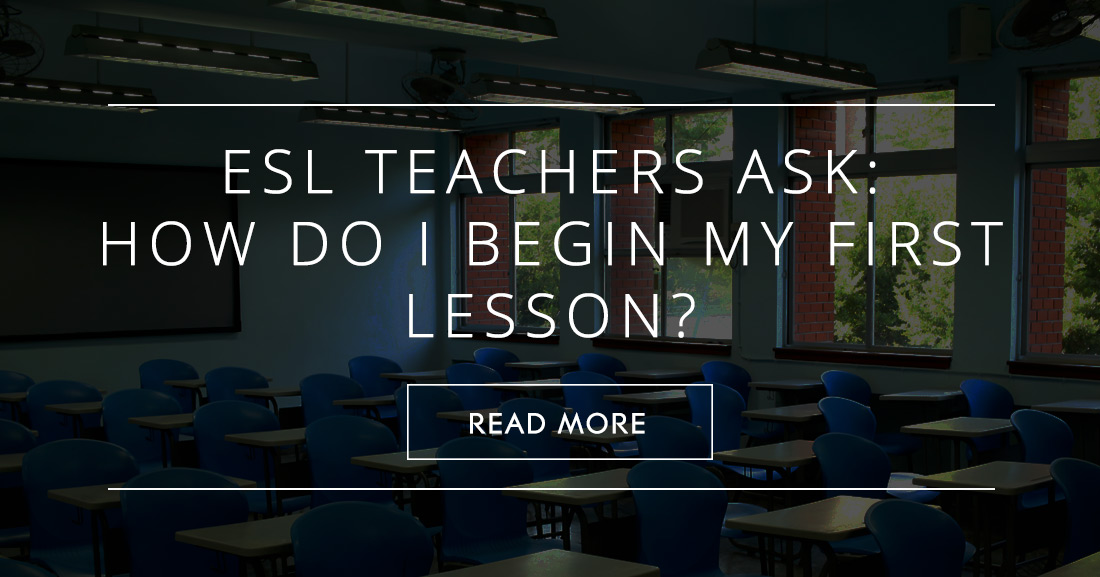Help! I’m going to teach my very first ESL class soon, and I don’t know how to ‘break the ice’. I don’t want to seem like an inexperienced, boring teacher. How should I start my class in a fun way?” *
Oh, so much is happening on the first day of class.
So much excitement! So many expectations! But if this is your very first day of class — ever — you may be feeling a little less excited and a lot more anxious. Here are some ideas for that big, all-important day in your career.

Check Out These 4 Different Ways to Begin Your First Lesson
-
1
Getting to Know You
You may choose to start off with the getting to know each other portion of the class. Now, you can do this the classic, simple way, which involves telling them about yourself and asking them questions about their likes, preferences, hobbies, etc... Or you can do this the fun way! Like this:
- Have them ask you questions, but not your ordinary, “Are you married or single?” type of questions. Divide students into groups and give each group a set of index cards with random words in them, like Superman, wizard, flying, etc… Students must come up with questions to ask you, which include at least one of these words: Are you afraid of flying?
- Play a game like Hot Seat so students can get to know each other.
-
2
Goal Setting
You may also choose to begin by asking them about their goals: Why are you studying English? Again, there is a simple, straightforward way of doing this and a more interesting way. Students often state that their goal is to “speak English” or “speak more” or even “speak more better English”. Now, what if you were to set more specific goals, even fun goals?
- Ask students to get really specific. Do they need English to travel? Work? Do Internet research for college? Prompt students to write these specific goals on a piece of paper.
- Ask students to take each goal and dig deeper, and get even more specific. Why do they need English to travel? (They need to check in/check out of hotels, ask questions at the airport/restaurants/etc…) The inverted triangle is a great graphic organizer to use for this type of specific goal setting.
-
3
Rule Setting
Classroom rules are an absolute must, above all in classrooms with young learners. But students don’t like it when a teacher starts a lesson by saying, “Here are the rules.” Well, at the very least, that’s no fun! Start the lesson by giving them an overview of the types of activities you’ll do in class, but that to ensure that everyone has a good time and learns a whole lot of English, you’ll have to come up with some rules — as a group.
- Ask students to imagine the “perfect ESL classroom” (but a real not a fantasy classroom). What would this classroom be like? How do students act in this classroom? (Students let others speak and don’t interrupt. They are respectful and kind. They don’t shout or throw things. Etc…)
- As students come up with ideas, write them down on the board.
- Obtain students’ agreement that these ideas are good rules for their class.
- Students copy the rules onto a piece of posterboard. Each one signs the poster at the bottom.
- Here's the fun part! To reinforce the rules you’ve set as a group, play this board game. Print out a copy of a blank board game. On a separate piece of paper, write a “behavior” for each numbered box and the “consequence”. The consequences involve moving forward or going back a number of boxes, depending on the behavior. Student A rolls the dice and lands on number 7. Number 7 says, “You threw a pen back to your classmate instead of handing it over. Go back 2 boxes”. Obviously, the best behaved student will win!
-
4
Breaking the Ice
At BusyTeacher.org, we have an entire section on ice breakers, most of which you can use on your very first day of class. Instead of launching into a speech about what they can expect from the class and what you expect from them, you could simply start with an ice breaker. It will tell your class exactly what to expect from you. Fun, engaging lessons year round!
- Review classroom language that they can use year round.
- Take an interest survey to find out more about your new students.
- Play a game so students can remember classmates’ names.
Whichever way you choose to start your first lesson, choose a way that works for you.
Relax and have fun! Give them the opportunity to get to know you, and to learn that you’re willing to go the extra mile to help them succeed and achieve their learning goals — while having fun at the same time. You’ll definitely start on the right foot!
P.S. If you enjoyed this article, please help spread it by clicking one of those sharing buttons below. And if you are interested in more, you should follow our Facebook page where we share more about creative, non-boring ways to teach English.







